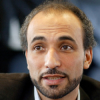Tariq Ramadan

Tariq Ramadan
Tariq Ramadanis a Swiss academic, philosopher and writer. He is the professor of Contemporary Islamic Studies in the Faculty of Oriental Studies at St Antony's College, Oxford and also teaches at the Oxford Faculty of Theology. He is a visiting professor at the Faculty of Islamic Studies, the Université Mundiapolisand several other universities around world. He is also a senior research fellow at Doshisha University. He is the director of the Research Centre of Islamic Legislation and Ethics, based in...
NationalitySwiss
ProfessionWriter
Date of Birth26 August 1962
CountrySwitzerland
The problem with Salafis is that they are religiously sincere and politically naïve. And they allow themselves to be supported by people who have no religious sincerity but who are politically very smart, especially when it comes to their economic interests.
An 'Islamic economy' or 'Islamic finance' doesn't mean anything to me. But I do think that in the multi-polar world, it is time to find new partners, to find a new balance in the economic order. And this could help you to find an alternative way forward.
The problem with what we call the 'Arab spring' is that these are very nationalistic experiences. Tunisians are concerned with Tunisia, Egyptians concerned with Egypt and so on.
Still I have been invited I don't know how many times to Turkey, where Turkey has been following very quickly in the footsteps of what is sometimes referred to as the movement of cyber-dissidents. They have been training young people and also encouraging them to come into contact with western Muslims.
I don't like this vision that Turkey is successful because it is as successful as the western powers in economic terms. But I do think they are trying to find a new space in the multi-polar world, and this is what I am advocating. I don't think that Muslims have an alternative model.
The West hasn't been naïve, it has been patronizing the South by imposing its own views on what should be done - ironically after having been so close and so supportive of dictators who were not respecting the people.
What you need to do is protect the structures and dynamics that are helping the people choose. The only thing that we can do is to respect the will of the people when it comes to majority processes. It is not for us to impose a model, it is not for us to impose answers to some critical questions.
I wouldn't call it naïve but silly. History does not work like this. If you look at the dynamics of Eastern Europe or even Germany post reunification, you realize that change takes time. No one can deny the fact that we are still not there - I am advocating something which has to go from uprisings to revolutions. It is not coming straight away that it is not going to come but what we have to advocate is that the democratization process is always better than state dictatorship.
The Islamic world is obsessed with the notion of strong leaders. This is a mistake. We don't need powerful leaders, but rather unconventional, progressive thinkers with the courage to open our minds.
Feeling sympathy and searching for explanations isn't the same as believing that the violence is justified.
The suicide bomber who blows up Israeli children cannot transform himself into a martyr. The Palestinian problem is not an Islamic problem.
Even the concept of the infidel is misleading, because the infidel is normally someone with a different faith, someone who refuses to recognize the truth of the words of the Koran, as revealed by God. He has every right to do so, as long as he does not question my right to believe in my truth.
The logic of freedom of religion implies freedom to be an atheist, even though, from a historical perspective, this has not been accepted in the Muslim world.
The dogmatic and, therefore, invulnerable core in Islam is understandably simple: acknowledgement of faith, prayer, charity and fasting. Almost everything else is open to interpretation and modification in space and time.